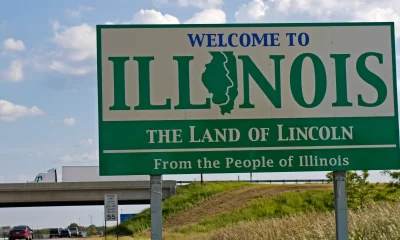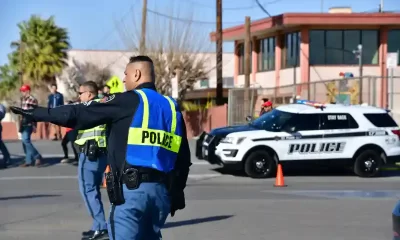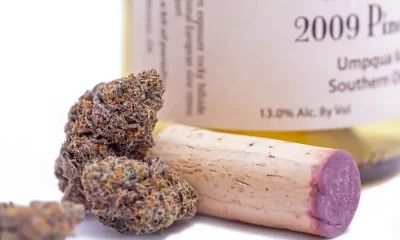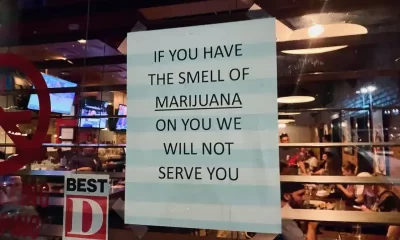Business
Nate Diaz Denied Pot Exemption for Drug Test Ahead of Jake Paul Fight

A Texas commission denied a request for Nate Diaz to avoid drug testing for pot ahead of the Jake Paul fight.
Nate Diaz and Jake Paul will face off in the boxing ring on August 5 at the American Airlines Center in Dallas, Texas. The eight-round pay-per-view (PPV) event on Showtime is Diaz’s professional boxing debut following his decorated career in mixed martial arts (MMA) as a UFC fighter.
Diaz was denied a request for an exemption from the Texas Department of Licensing & Regulation (TDLR). The TDLR has a zero-tolerance policy for cannabis use, but Diaz’s manager Zach Rosenfield requested an exemption.
Questions arose whether the Voluntary Anti-Doping Association (VADA)—an organization that provides anti-doping practices and programs in boxing and mixed martial arts—may supersede the TLDR, MMA Fighting first reported. A TDLR spokesperson told Steven Marrocco of MMA Fighting that Diaz will be subject to the same rules as everyone else in combative sports.
For the time being, it looks like Diaz will still be screened for THC.
“We will be working with VADA on testing prior to the fight and will be in compliance with all VADA rules, as well as the rules and regulations set forth by TDLR,” Real Fight, Inc. President and Diaz manager Zach Rosenfield told High Times.
Many professional athletes know what they can and cannot get away with regarding drug testing for pot, and the timing involved. “We gonna be testing,” Diaz told reporters at a press conference, referring to the drug test sample. “There’s a lot of weed in [my system]. There is.”
Diaz taunted Paul on Twitter, to which the former YouTuber fired back. “You speaking to me Nathan?” Paul said, responding to Diaz’s tweet. “We haven’t forgotten that you tested positive for steroids. You and your boyfriend Connor are juice heads. Let’s do 15 rounds and see how good those cannabis corroded lungs are. VADA going to be coming to Stockton to slap you up.”
If it were a UFC fight, the request might have resulted in a different outcome. The U.S Anti-Doping Agency (USADA) adopted guidelines to no longer punish UFC fighters when THC is detected in a drug test in 2021.
In addition to mandatory drug tests from TDLR, Diaz and Paul will likely provide samples to the VADA both before and after their boxing match in Dallas.
Everything is on the line, at least for Paul’s boxing career. A surprise knockout by Tommy “The Truth” Fury on February 26 in Diriyah, Saudi Arabia, cost a lot of bettors money. That makes Paul 6-1 in the boxing ring, beating AnEsonGib, Nate Robinson, Ben Askren, and Tyron Woodley twice.
Paul has been subject to drug tests multiple times since his transformation from a YouTube star (along with his brother Logan) to boxing. Paul did not like a question during an interview ahead of the Diaz fight by a reporter who suggested he is not destined for the Hall of Fame.
“See, I’ve done more for the sport than any boxer in current history,” Paul said. “What has Floyd Mayweather done for women’s boxing? The list goes on. I’ve changed the whole entire game, brought a new 70 million followers to the sport and put on bigger pay-per-views than some of these Hall of Fame guys. Ryan Garcia-Gervonta ‘Tank’ Davis, 800,000 pay-per-views. Me vs. Tommy, 830,000. So, you wanna talk about Hall of Famers? You wanna talk about resume? Yeah, I’m building it up, buddy. I just got started in this game. This is my eighth fight and I’m fighting Nate Diaz, one of the biggest MMA fighters in history. So, yeah, that’s my resume.”
Diaz and his brother Nick have spoken out regarding pot reform for years. The two eventually launched Game Up® Nutrition, a plant-based wellness company providing products loaded with cannabinoids, adaptogens, and superfoods.
Over a decade ago Nick told the Los Angeles Times his cleansing method before a drug test. This followed a technical knockout (TKO) win over Frank Shamrock back in 2009, who is also an outspoken cannabis advocate.
Source: https://hightimes.com/sports/nate-diaz-denied-pot-exemption-for-drug-test-ahead-of-jake-paul-fight/
Business
New Mexico cannabis operator fined, loses license for alleged BioTrack fraud

New Mexico regulators fined a cannabis operator nearly $300,000 and revoked its license after the company allegedly created fake reports in the state’s traceability software.
The New Mexico Cannabis Control Division (CCD) accused marijuana manufacturer and retailer Golden Roots of 11 violations, according to Albuquerque Business First.
Golden Roots operates the The Cannabis Revolution Dispensary.
The majority of the violations are related to the Albuquerque company’s improper use of BioTrack, which has been New Mexico’s track-and-trace vendor since 2015.
The CCD alleges Golden Roots reported marijuana production only two months after it had received its vertically integrated license, according to Albuquerque Business First.
Because cannabis takes longer than two months to be cultivated, the CCD was suspicious of the report.
After inspecting the company’s premises, the CCD alleged Golden Roots reported cultivation, transportation and sales in BioTrack but wasn’t able to provide officers who inspected the site evidence that the operator was cultivating cannabis.
In April, the CCD revoked Golden Roots’ license and issued a $10,000 fine, according to the news outlet.
The company requested a hearing, which the regulator scheduled for Sept. 1.
At the hearing, the CCD testified that the company’s dried-cannabis weights in BioTrack were suspicious because they didn’t seem to accurately reflect how much weight marijuana loses as it dries.
Company employees also poorly accounted for why they were making adjustments in the system of up to 24 pounds of cannabis, making comments such as “bad” or “mistake” in the software, Albuquerque Business First reported.
Golden Roots was fined $298,972.05 – the amount regulators allege the company made selling products that weren’t properly accounted for in BioTrack.
The CCD has been cracking down on cannabis operators accused of selling products procured from out-of-state or not grown legally:
- Regulators alleged in August that Albuquerque dispensary Sawmill Sweet Leaf sold out-of-state products and didn’t have a license for extraction.
- Paradise Exotics Distro lost its license in July after regulators alleged the company sold products made in California.
Golden Roots was the first alleged rulebreaker in New Mexico to be asked to pay a large fine.
Source: https://mjbizdaily.com/new-mexico-cannabis-operator-fined-loses-license-for-alleged-biotrack-fraud/
Business
Marijuana companies suing US attorney general in federal prohibition challenge

Four marijuana companies, including a multistate operator, have filed a lawsuit against U.S. Attorney General Merrick Garland in which they allege the federal MJ prohibition under the Controlled Substances Act is no longer constitutional.
According to the complaint, filed Thursday in U.S. District Court in Massachusetts, retailer Canna Provisions, Treevit delivery service CEO Gyasi Sellers, cultivator Wiseacre Farm and MSO Verano Holdings Corp. are all harmed by “the federal government’s unconstitutional ban on cultivating, manufacturing, distributing, or possessing intrastate marijuana.”
Verano is headquartered in Chicago but has operations in Massachusetts; the other three operators are based in Massachusetts.
The lawsuit seeks a ruling that the “Controlled Substances Act is unconstitutional as applied to the intrastate cultivation, manufacture, possession, and distribution of marijuana pursuant to state law.”
The companies want the case to go before the U.S. Supreme Court.
They hired prominent law firm Boies Schiller Flexner to represent them.
The New York-based firm’s principal is David Boies, whose former clients include Microsoft, former presidential candidate Al Gore and Elizabeth Holmes’ disgraced startup Theranos.
Similar challenges to the federal Controlled Substances Act (CSA) have failed.
One such challenge led to a landmark Supreme Court decision in 2005.
In Gonzalez vs. Raich, the highest court in the United States ruled in a 6-3 decision that the commerce clause of the U.S. Constitution gave Congress the power to outlaw marijuana federally, even though state laws allow the cultivation and sale of cannabis.
In the 18 years since that ruling, 23 states and the District of Columbia have legalized adult-use marijuana and the federal government has allowed a multibillion-dollar cannabis industry to thrive.
Since both Congress and the U.S. Department of Justice, currently headed by Garland, have declined to intervene in state-licensed marijuana markets, the key facts that led to the Supreme Court’s 2005 ruling “no longer apply,” Boies said in a statement Thursday.
“The Supreme Court has since made clear that the federal government lacks the authority to regulate purely intrastate commerce,” Boies said.
“Moreover, the facts on which those precedents are based are no longer true.”
Verano President Darren Weiss said in a statement the company is “prepared to bring this case all the way to the Supreme Court in order to align federal law with how Congress has acted for years.”
While the Biden administration’s push to reschedule marijuana would help solve marijuana operators’ federal tax woes, neither rescheduling nor modest Congressional reforms such as the SAFER Banking Act “solve the fundamental issue,” Weiss added.
“The application of the CSA to lawful state-run cannabis business is an unconstitutional overreach on state sovereignty that has led to decades of harm, failed businesses, lost jobs, and unsafe working conditions.”
Business
Alabama to make another attempt Dec. 1 to award medical cannabis licenses

Alabama regulators are targeting Dec. 1 to award the first batch of medical cannabis business licenses after the agency’s first two attempts were scrapped because of scoring errors and litigation.
The first licenses will be awarded to individual cultivators, delivery providers, processors, dispensaries and state testing labs, according to the Alabama Medical Cannabis Commission (AMCC).
Then, on Dec. 12, the AMCC will award licenses for vertically integrated operations, a designation set primarily for multistate operators.
Licenses are expected to be handed out 28 days after they have been awarded, so MMJ production could begin in early January, according to the Alabama Daily News.
That means MMJ products could be available for patients around early March, an AMCC spokesperson told the media outlet.
Regulators initially awarded 21 business licenses in June, only to void them after applicants alleged inconsistencies with how the applications were scored.
Then, in August, the state awarded 24 different licenses – 19 went to June recipients – only to reverse themselves again and scratch those licenses after spurned applicants filed lawsuits.
A state judge dismissed a lawsuit filed by Chicago-based MSO Verano Holdings Corp., but another lawsuit is pending.
Source: https://mjbizdaily.com/alabama-plans-to-award-medical-cannabis-licenses-dec-1/
-

 Business2 years ago
Business2 years agoPot Odor Does Not Justify Probable Cause for Vehicle Searches, Minnesota Court Affirms
-

 Business2 years ago
Business2 years agoNew Mexico cannabis operator fined, loses license for alleged BioTrack fraud
-

 Business2 years ago
Business2 years agoAlabama to make another attempt Dec. 1 to award medical cannabis licenses
-

 Business2 years ago
Business2 years agoWashington State Pays Out $9.4 Million in Refunds Relating to Drug Convictions
-

 Business2 years ago
Business2 years agoMarijuana companies suing US attorney general in federal prohibition challenge
-

 Business2 years ago
Business2 years agoLegal Marijuana Handed A Nothing Burger From NY State
-

 Business2 years ago
Business2 years agoCan Cannabis Help Seasonal Depression
-

 Blogs2 years ago
Blogs2 years agoCannabis Art Is Flourishing On Etsy













